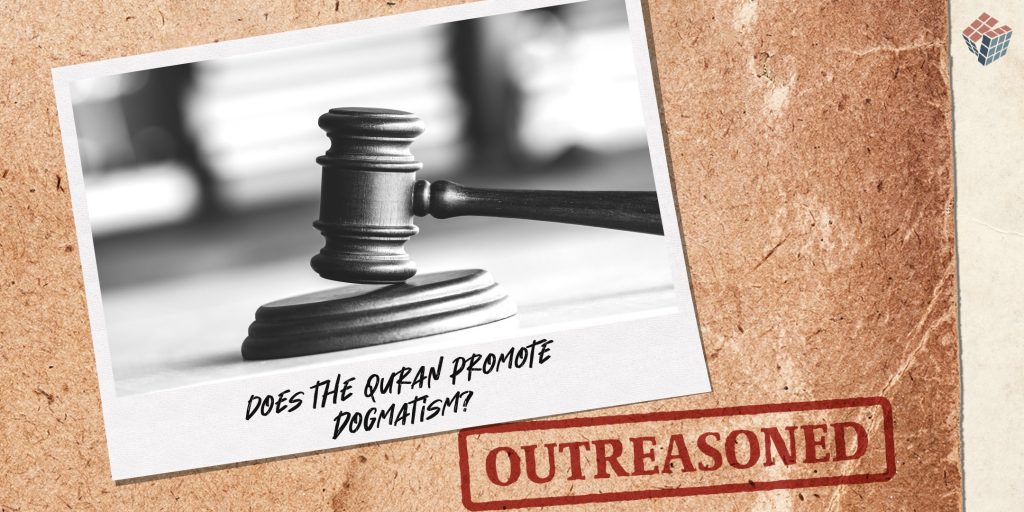
Sohail argues that the Quranic warnings relating to disbelief and disbelievers are contrary to the spirit of rational enquiry and rather, encourage dogmatism by preventing Muslims from thinking for themselves. He writes:
Most religions have warnings to the net effect of “the disbelievers are trying to get you to abandon your faith, but if you do, the Merciful God will throw you in Hell, so don’t even consider it!”
Now if these religions are not all “true” in their current form, then picking one religion’s warnings means that you are ignoring (at least in part) the warnings of other religions...it does nothing to encourage you to consider, hypothetically, what if this isn’t true? How might I go about discovering that? The Qur’an doesn’t even acknowledge that a person could be sincere in their rejection of Islam. It paints a picture of every single ex-Muslim as necessarily disingenuous.
That characterization is itself, quite disingenuous of the author of the Qur’an.
Refutation
This is an argument based on false characterisation. At no point does the Quran state that Muslims should not consider the arguments of other religions, or indeed, of disbelief. On the contrary. The Quran makes repeated and emphatically the argument that the position of the rational, thinking person, is of belief in Islam and the Quran. Indeed, disbelievers are not condemned for their use of reason, but for their lack of it. Indeed, the Quran warns that if you don’t use your reason, God will punish you with His wrath:
And they will cry for help therein, ‘O our Lord, take us out, we will do righteous works other than those we used to do.’ ‘Did We not give you a life long enough so that he who would reflect could reflect therein? And there came unto you a Warner too. So taste ye the punishment; for wrongdoers have no helper.’
Quran 35:38
And no soul can believe except by the permission of Allah. And He makes His wrath descend on those who will not use their reason.
Quran 10:101
I was spoilt for choice in this respect, but I have chosen two verses that directly counter his point. His characterisation of Islam as a religion that does not encourage the use of reason is false. Rather, the Quran makes the argument that disbelief is the consequence of an infirmity of the mind. Yes, it makes clear that if you fail to make use of your reason, you will suffer for it. But is this really Sohail’s objection to the Quran? That it places too heavy a price on the use of reason?
He seems to have gotten himself in a tangle.
As for the argument that one is “ignoring (at least in part) the warnings of other religions”, this is an argument so foolish it is difficult to reply. Nobody chooses a religion on the basis of which religious teaching gives the most awful warning about disbelief. Rightly or wrongly, people choose a religion on the basis of its doctrines, its understanding of salvation, what their cultural heritage is, and also what the religion requires of them. Some of those criteria are valid, some should be discounted. But those are, roughly, what influence people’s decision making. I have never heard a person choosing a religion because its description of hell is the worst and its warnings of disbelief, the most dire.
Further, the Islamic argument is that religions were all true at their inception but have degenerated over time. The Quran claims that it was sent to revive their message, meaning that the warnings of the original texts of various religions are also applicable to rejecting the Quran, since it is disobedience to God’s message, in whatever form, that is warned against. A religion not being “true” in its current form does not mean that the warning it proclaims was meant for the teachings espoused by the followers of that religion today. It means the warnings were true and are true, as regards the original teaching of that religion, which today is espoused in Islam.
Finally, the Quran repeatedly and emphatically asks the reader to check if the book isn’t true. It also repeatedly explains how a person might go about discovering whether it is true or not. The entire Quran is, in effect, replete with such statements. The Quran does recognise that people could be either sincere or insincere in their rejection of Islam, but that is not inconsistent with describing such individuals as foolish or wicked. One who rejects the truth for sincere, misguided reasons is foolish; and one who rejects out of insincere, disingenuous reasons, is wicked. Either they reject because they have not used their reasoning correctly or because they are lying to themselves and others.
And if you are in doubt as to what We have sent down to Our servant, then produce a Chapter like it, and call upon your helpers beside Allah, if you are truthful.
Quran 2:24
Will they not, then, meditate upon the Quran? Had it been from anyone other than Allah, they would surely have found therein much disagreement.
Quran 4:83
Or, Who answers the distressed person when he calls upon Him, and removes the evil, and makes you successors in the earth? Is there a God besides Allah? Little is it that you reflect.
Quran 27:63
And when My servants ask thee about Me, say: ‘I am near. I answer the prayer of the supplicant when he prays to Me. So they should hearken to Me and believe in Me, that they may follow the right way.’
Quran 2:187
And as for those who strive in Our path — We will surely guide them in Our ways. And verily Allah is with those who do good.
Quran 29:70
But the Messenger and those who believe with him strive in the cause of Allah with their property and their persons, and it is they who shall have good things, and it is they who shall prosper.
Quran 9:88
These are the limits set by Allah; and whoso obeys Allah and His Messenger, He will make him enter Gardens through which streams flow; therein shall they abide; and that is a great triumph.
Quran 4:14
Some of them enjoin the use of reason; others explain that the highest fruits of knowledge, provision and bounty are given to those who obey Allah and His Messenger – in other words – practically follow the Quranic teachings. This is precisely the argument of Islam – that following the Prophet of Islam leads to spiritual and worldly provision in this life, and gives knowledge that God exists, through revelatory experience. This is what is referred to as the descent of angels, who speak to the people:
As for those who say, ‘Our Lord is Allah,’ and then remain steadfast, the angels descend on them, saying: ‘Fear ye not, nor grieve; and rejoice in the Garden that you were promised.
Quran 41:31
But perhaps the descent of angels and the reception of revelation would not be enough to satisfy the elevated reasoning of those such as Sohail. After all, the Quran also warns:
And even if We opened to them a door from heaven, and they began ascending through it, They would surely say, ‘Only our eyes are dazed; rather we are a bewitched people.’
Quran 15:15-16
This is entirely in line with Professor Dawkins’ own view which is that if he were to witness a true miracle that could not be explained except through invoking God, then he would be more likely to believe that he had hallucinated the experience. This of course makes his atheism unfalsifiable. Which makes it antithetical to reason. Which is precisely what the Quran points out; atheism is not born of reason, but out of the lack of the use of the faculty of reasoning.


